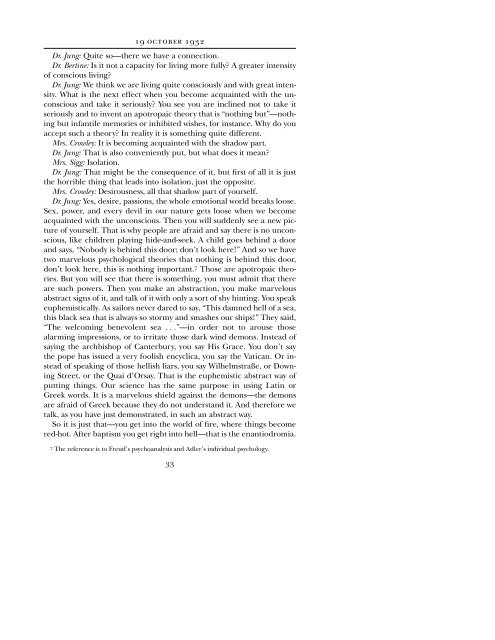CG JUNG - Countryside Anarchist
CG JUNG - Countryside Anarchist
CG JUNG - Countryside Anarchist
Create successful ePaper yourself
Turn your PDF publications into a flip-book with our unique Google optimized e-Paper software.
19 OCTOBER 1932<br />
Dr. Jung: Quite so—there we have a connection.<br />
Dr. Bertine: Is it not a capacity for living more fully? A greater intensity<br />
of conscious living?<br />
Dr. Jung: We think we are living quite consciously and with great intensity.<br />
What is the next effect when you become acquainted with the unconscious<br />
and take it seriously? You see you are inclined not to take it<br />
seriously and to invent an apotropaic theory that is “nothing but”—nothing<br />
but infantile memories or inhibited wishes, for instance. Why do you<br />
accept such a theory? In reality it is something quite different.<br />
Mrs. Crowley: It is becoming acquainted with the shadow part.<br />
Dr. Jung: That is also conveniently put, but what does it mean?<br />
Mrs. Sigg: Isolation.<br />
Dr. Jung: That might be the consequence of it, but first of all it is just<br />
the horrible thing that leads into isolation, just the opposite.<br />
Mrs. Crowley: Desirousness, all that shadow part of yourself.<br />
Dr. Jung: Yes, desire, passions, the whole emotional world breaks loose.<br />
Sex, power, and every devil in our nature gets loose when we become<br />
acquainted with the unconscious. Then you will suddenly see a new picture<br />
of yourself. That is why people are afraid and say there is no unconscious,<br />
like children playing hide-and-seek. A child goes behind a door<br />
and says, “Nobody is behind this door; don’t look here!” And so we have<br />
two marvelous psychological theories that nothing is behind this door,<br />
don’t look here, this is nothing important. 7 Those are apotropaic theories.<br />
But you will see that there is something, you must admit that there<br />
are such powers. Then you make an abstraction, you make marvelous<br />
abstract signs of it, and talk of it with only a sort of shy hinting. You speak<br />
euphemistically. As sailors never dared to say, “This damned hell of a sea,<br />
this black sea that is always so stormy and smashes our ships!” They said,<br />
“The welcoming benevolent sea . . .”—in order not to arouse those<br />
alarming impressions, or to irritate those dark wind demons. Instead of<br />
saying the archbishop of Canterbury, you say His Grace. You don’t say<br />
the pope has issued a very foolish encyclica, you say the Vatican. Or instead<br />
of speaking of those hellish liars, you say Wilhelmstraße, or Downing<br />
Street, or the Quai d’Orsay. That is the euphemistic abstract way of<br />
putting things. Our science has the same purpose in using Latin or<br />
Greek words. It is a marvelous shield against the demons—the demons<br />
are afraid of Greek because they do not understand it. And therefore we<br />
talk, as you have just demonstrated, in such an abstract way.<br />
So it is just that—you get into the world of fire, where things become<br />
red-hot. After baptism you get right into hell—that is the enantiodromia.<br />
7 The reference is to Freud’s psychoanalysis and Adler’s individual psychology.<br />
33


